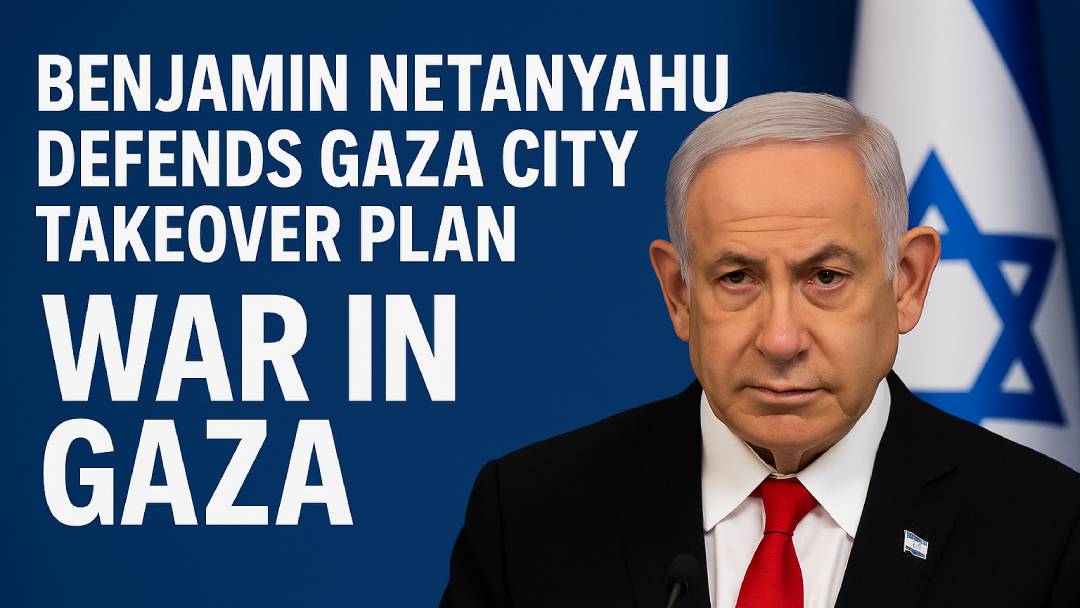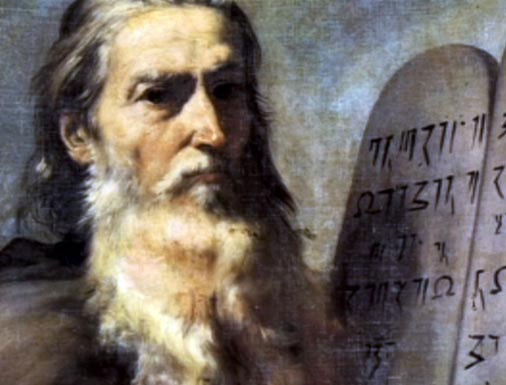Israeli prime minister told reporters the operation was the best way of ending the war, saying Israel had “no choice but to finish the job and defeat Hamas”.
Let’s go to Jerusalem, where Israel’s Prime Minister, Benjamin Netanyahu, is holding a news conference.
The savagery of the October 7th massacre — and Hamas’s stated intent to repeat it again and again — must be understood in full. Hamas openly professes its goal to destroy the State of Israel. It subjugates Gazans, steals their food, and shoots them when they try to move to safe zones.
It is telling that many Gazans are now fighting back. They are begging us — and the world — “Free us. Free us and free Gaza from Hamas.”
No nation can accept a genocidal terrorist organization, one committed to its annihilation, just a stone’s throw from its citizens. Our goal is not to occupy Gaza; our goal is to free Gaza — free it from Hamas terrorists.
The war can end tomorrow if Hamas lays down its arms and releases all the remaining hostages. Gaza will be demilitarized, and Israel will have overriding security responsibility. A security zone will be established on Gaza’s border with Israel to prevent future terrorist incursions. A civilian administration will be established in Gaza that seeks to live in peace with Israel.
That is our plan for the day after Hamas. Let me summarize it with five principles for concluding the war:
- Hamas disarmed.
- All hostages freed.
- Gaza demilitarized.
- Israel maintains overriding security control.
- A peaceful civilian administration — one that does not educate its children for terror, does not pay terrorists, and does not launch attacks against Israel.
It will be neither Hamas nor the Palestinian Authority.
Given Hamas’s refusal to lay down its arms, Israel has no choice but to finish the job and complete the defeat of Hamas. We now have 70–75% of Gaza under Israeli military control, but two major strongholds remain: Gaza City and the central camps in Al-Mawasi.
Last Thursday, Israel’s Security Cabinet instructed the IDF to dismantle these two remaining Hamas strongholds. Contrary to false claims, this is the best way to end the war — and to end it quickly.
We will first enable the civilian population to safely leave combat areas for designated safe zones. In these zones, they will receive food, water, and medical care — as we have done before. Throughout the war, Israel’s policy has been to prevent a humanitarian crisis, while Hamas’s policy has been to create one.
Since the beginning of the war, Israel has allowed in nearly two million tons of aid. No other army has enabled such aid to reach civilians in enemy territory. If we had a starvation policy, no one in Gaza would have survived two years of war. Instead, our policy has been the opposite — to allow in massive aid and to contact civilians directly via millions of text messages and phone calls, warning them to move to safety.
In recent months, Hamas has violently looted aid trucks, creating deliberate shortages. Until recently, the UN refused to distribute thousands of truckloads of aid that Israel facilitated through the Kerem Shalom crossing. As a result, food has rotted on the Gazan side of the border.
We are now bypassing these obstacles in three ways:
- Safe humanitarian corridors for aid distribution.
- Increased distribution points managed by the Gazan Humanitarian Foundations.
- Airdrops by the Israeli Air Force, with invitations for others to join.
The result has been a humanitarian surge, coordinated with President Trump and his team, with hundreds of trucks entering in recent days. Despite this, a global campaign of lies persists.
Two million people in Gaza now have access to humanitarian aid — but the only people being deliberately starved are our hostages. For example, Davidid, one of our hostages, is being starved by Hamas captors, who themselves are well-fed.
This news conference is intended to puncture the lies and spread the truth. Just as in the Middle Ages, false accusations against Jews — such as poisoning wells or using Christian children’s blood — were used to justify massacres, today’s distortions fuel modern-day vilification of the Jewish state.
The international press has repeated Hamas’s statistics, claims, forgeries, and staged photographs without proper verification. Netanyahu cited three high-profile cases of children depicted as victims of Israeli “starvation” that were, in fact, cases of severe congenital illness, unrelated to nutrition — and in some cases, treated in Israel itself.
He concluded: “Hamas lies. Now you can ask me any question you want.”
Q&A Session
Journalist: Could you give us a timeline for concluding the new offensive, and more details about the humanitarian surge and the role of the Gazan Humanitarian Foundations (GHF)?
Prime Minister Netanyahu: The timeline for this action is short. First, we will establish safe zones and facilities so civilians in Gaza City can move out, just as they did in Rafah.
In Rafah, there were 1.4 million people. Critics said they had nowhere to go and wouldn’t move. Yet in six to eight days, they all moved to the Al-Mawasi area, with virtually no civilian casualties.
We believe we can achieve a similar result — safeguarding the civilian population while dismantling Hamas’s last major stronghold. We will not give an exact timetable, but our goal is to end the war quickly.
Regarding the humanitarian surge, we are:
- Designating safe aid corridors.
- Expanding GHF distribution points.
- Increasing airdrops, with the hope of recruiting more international partners, including the UN, if they choose to bypass Hamas.
The most important element is ground delivery of aid, preventing Hamas from looting it.
Journalist: Why is Israel not allowing foreign journalists into Gaza? And secondly, President Trump has said there is real starvation in Gaza. Do you disagree?
Prime Minister Netanyahu: I have already ordered the military to bring in more foreign journalists. Security must be ensured, but I believe it can be done responsibly. Two days ago, I issued that directive, and I expect it to be implemented soon.
Once inside, journalists will see for themselves: aid trucks inside Gaza waiting for distribution, Gazans fighting Hamas for the first time during this war, and the destruction caused by Hamas booby-trapping buildings, roads, and tunnels.
Regarding President Trump, I value his strong support throughout this war and in countering the existential threat from Iran. He has stated two key points: all hostages must be released, and Hamas must be removed. He recognizes that any deprivation in Gaza is caused by Hamas, and we are working together to overcome it.
Journalist: Is Israel operating under the belief it can recover all 20 living hostages alive?
Prime Minister Netanyahu: My goal is to recover all 20 living hostages — and the remains of those who are not alive. Early in the war, a senior commander told me to accept that we would not recover even one alive. I disagreed.
So far, out of 255 hostages, we have recovered 205, of whom 148 are alive. If we do nothing, we will get no one else back. A war of attrition will not succeed; it will prolong the conflict. Our current operation has a chance of bringing them home.
Journalist: You’ve said Gaza will be handed to a civilian administration that is neither Hamas nor the Palestinian Authority. Who would that be, and what is your timeline?
Prime Minister Netanyahu: There are several candidates and models for a transitional civilian authority. I will not reveal names now, to preserve our chances of success.
Our goal is clear: Hamas must be gone, and what replaces it must not promote, finance, or engage in terrorism, and must be willing to live in peace. No one will step in to govern unless we first finish the job of defeating Hamas.
Journalist (Germany): The German Chancellor has again defended his decision not to send weapons to Israel for use in Gaza, saying “friendship can and must withstand that.” How has the relationship changed?
Prime Minister Netanyahu: I respect Chancellor Merz and consider him a friend of Israel, but I believe he has yielded to internal and media pressures based on false reports.
Some leaders admit to me they know Israel is right, but they cannot withstand public opinion at home. That is their problem, not ours. History teaches us that appeasement of aggressors — whether in Munich in 1938 or now with Hamas — does not bring peace.
We will do what is necessary to defend our country, with or without external support. And I believe when we win, some who now withhold support will change their stance.
Journalist: You’ve mentioned the “eighth front” — the propaganda war. Is Israel winning or losing it? Have you spoken with President Trump since the Security Cabinet approved this plan?
Prime Minister Netanyahu: On the propaganda war, we are not winning. Social media algorithms and bot networks are stacked against us — experts say about 60% of hostile responses online are generated by bots, often from abroad, pretending to be grassroots voices.
We must respond with the truth more frequently and more forcefully. Ultimately, the best way to win the propaganda war is to win the actual war — and win it quickly.
As for President Trump, I have not spoken to him since last Thursday, but I intend to do so soon.
Journalist (Sky News UK): Given what the IPC calls the “spectre of famine” in Gaza, do you accept that Israel’s 11-week complete blockade contributed to that? And how will you prevent further deaths at aid sites when more people are displaced?
Prime Minister Netanyahu: The blockade was intended to stop Hamas looting, which everyone saw happening. We tried to route aid through GHF distribution points, but Hamas interfered with those as well.
We have never had a starvation policy, just as we do not have a genocide policy — both accusations are false. There was deprivation, yes, and we have addressed it with the humanitarian surge I described.
Since then, food prices in Gaza have dropped sharply, which proves aid is reaching people. More supply reduces crowding and danger at distribution points.
Journalist (ABC Australia): The UK, Canada, and France support Palestinian statehood in the near term, and Australia may follow. You have called this a reward for Hamas. Why?
Prime Minister Netanyahu: Those who say Israel has a right to defend itself but then oppose us exercising that right are being contradictory.
The belief that a Palestinian state would end the conflict is false. The Palestinians have rejected multiple statehood offers, including in 1947 and in more recent negotiations, because their goal is not to create a state but to destroy the Jewish state.
Hamas used its control of Gaza as a base for war; giving the same opportunity in Judea and Samaria would lead to the same result — only from a more dangerous position.
The conflict persists because of the refusal to recognize a Jewish state in any borders. Giving statehood without that change simply brings the next war closer.



